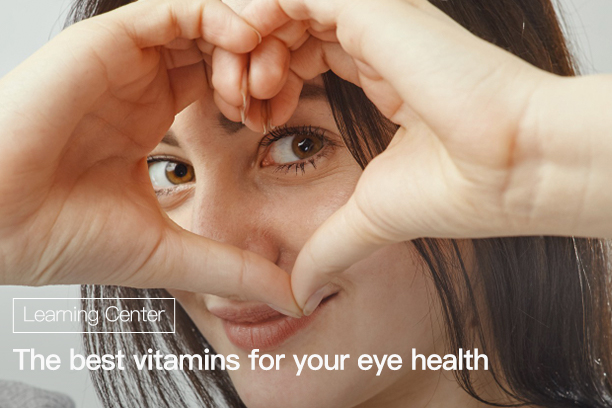- GlassesShop By FrameShop By StyleFeatured












Our eyes are a precious gift, allowing us to witness the beauty of the world around us. Maintaining good eye health is essential for a clear vision and overall well-being. While a balanced diet is crucial for optimal eye health, certain vitamins play a key role in supporting and protecting our eyes.

Vitamin A is vital for maintaining proper vision, especially in low-light conditions. It helps our eyes convert light into a signal that the brain interprets as an image. Additionally, it supports the health of the cornea, the outer protective layer of the eye. Foods rich in vitamin A include carrots,sweet potatoes, spinach, and beef liver.
As a potent antioxidant, vitamin C safeguards our eyes against oxidative stress caused by free radicals. It helps maintain the health of blood vessels in the eyes and may reduce the risk of developing cataracts. Citrus fruits, strawberries, bell peppers, and broccoli are excellent sources of vitamin C.
Vitamin E complements the action of vitamin C, offering additional protection against free radicals. It may help prevent age-related macular degeneration (AMD) and cataracts, promoting long-term eye health. Nuts, seeds, vegetable oils, and leafy greens are abundant sources of vitamin E.
Vitamin D is known for its role in maintaining bone health, but it also plays a part in reducing the risk of eye diseases. Some studies suggest that a deficiency in vitamin D may be linked to an increased risk of AMD. Sunlight exposure, fortified dairy products, and fatty fish like salmon are good sources of vitamin D.
Omega-3 fatty acids are essential for the health of the retina, the light-sensitive tissue at the back of the eye. These fatty acids contribute to proper tear production, reducing the risk of dry eyes. Cold-water fish, such as salmon, mackerel, and sardines, as well as flaxseeds and chia seeds,are rich in omega-3s.
Lutein and zeaxanthin are two powerful antioxidants that accumulate in the retina and lens. They help shield the eyes from harmful light rays, including ultraviolet (UV) rays, and may reduce the risk of cataracts and AMD. Leafy greens like kale and spinach, as well as egg yolks, are excellent sources of these nutrients.
Zinc is essential for the proper functioning of enzymes in the eyes, supporting healthy vision. It aids in the absorption of vitamin A and plays a role in protecting against AMD. Foods such as oysters, beef, poultry, and pumpkin seeds are rich in zinc.
While supplements can be beneficial, it's essential to prioritize a balanced diet as the primary source of these eye-nourishing vitamins. Fresh fruits, vegetables, nuts, and fish should form a significant part of your daily intake.
However, if your diet falls short in providing the recommended amounts of these essential vitamins, consider consulting an eye care professional or a registered dietitian. They can guide you in choosing suitable supplements to complement your diet and support your eye health effectively.
Caring for your eyes through proper nutrition is an investment in your long-term eye health and vision. Including a variety of nutrient-rich foods in your diet can provide the vitamins and minerals needed to keep your eyes functioning at their best. So, savor those vibrant veggies, indulge in a piece of fresh fruit, and savor the goodness of foods that nourish your eyes and keep the world a beautiful place to behold.

